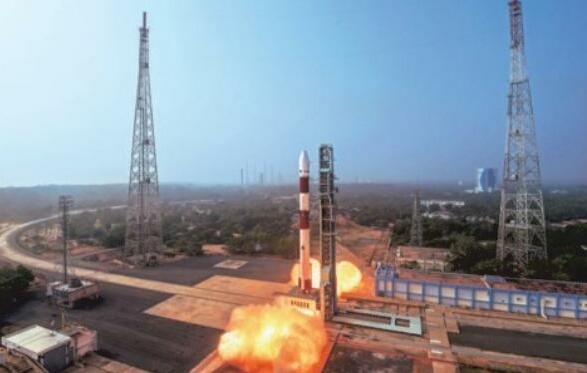ISRO heralds 2024with satellite to study black holes in space
| Date :02-Jan-2024 |

SRIHARIKOTA :
ISRO on Monday ushered in
2024 with the successful
launch of its first X-Ray
Polarimeter Satellite that
would offer insights into black
holes in the space, making the
country only the second to
conduct experiment into such
celestial objects.
Among the payloads that
piggybacked the space
agency’s ever reliable Polar
Satellite LaunchVehicle (PSLV)
was one made by women,
prompting ISRO to call it an
inspiration for the country.
The PSLV-C58 rocket, in its
60th mission, carried the primary payload XPoSat and
deployed it in an intended 650
km low earth orbit.
Later, scientists performed
the orbit lowering maneuver
by reducing the altitude to 350
km for conducting the POEM
experiment. Speaking at the
Mission Control Centre, ISRO
Chairman S Somanath said
“happy new year to all of you.”
“So on 1 January 2024, yet
another successful mission of
PSLV has been accomplished.
PSLV-C58 has placed the primary satellite XPoSat in the desired orbit.” The main Xray Polarimeter Satellite
(XPoSat)is intended to investigate the polarisation of
intense X-ray sources in
space. It is the first dedicated scientific satellite from
ISRO stable tocarry out such
research. US’ The National
Aeronautics and Space
Administration (NASA) had
conducted a similar study -
- the Imaging X-Ray
Polarimetry Explorer mission- in December 2021 on
the remnants of supernova
explosions, the particle
streams emitted by black
holes and other cosmic
events.
“Let me also
announce the orbit that has
been accomplished which is
available through various
routes--it shows excellent
orbitandthedeviationsfrom
the targeted orbit is hardly 3
km in circular orbit of 650km
and inclination is 001 degree
which is one of the very excellent orbital conditions,”
Somanath said.
“And yet another
announcement is that the
solarpanelofthesatellitehas
beendeployed successfully,”
headded.While space-based
X-ray astronomy has been
established in India focusing on imaging, and time
domain studies, Monday’s
mission marks a major value-addition to the scientific
fraternity, ISRO said.
The mission objective
includes measuring polarisation of X-rays in the energy band 8-30 keV emanating
from about 50 potential cosmicsources,tocarryoutlong
term spectral and temporal
studies of cosmic x-ray
sources.